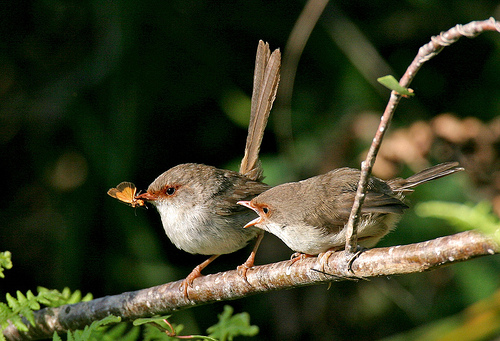Knock Knock, Who’s There? – Identification of fairy-wren chicks by their mums
Before you start thinking this is yet another knock-knock joke, think again! The importance of the ability to distinguish their chicks from parasites found in their nest is no laughing matter to a mother fairy-wren. Just like how our parents identify us by our unique names and surnames, the mother fairy-wrens recognize their chicks by listening out for the unique vocal ‘password’ which is only known between them both, a behavior marveled by many, including Ed Yong, an award winning science writer who wrote a blog post about them.
Before their eggs are even hatched, these female superb fairy-wren Malurus cyaneus would begin singing a special tune to them, a familial vocal password unique to its family. This ingenious behavior was adapted to counter exploitations by brood parasites, as observed by Sonia Kleindorfer, a professor at Flinders University in Adelaide.
With its nest having a domed structure and only a small side entrance on the exterior and being relatively dark inside, this makes it perfect for brood parasites to sneak their eggs into the nests of the fairy-wren, leaving them to incubate and care for their eggs. Thankfully, these eggs are often dropped off just a few days before the fairy-wren chicks hatch, leaving the chicks of the brood parasites with little time to learn the special tune (Colombelli-Négrel, et al., 2012). Hence, whenever the mother fairy-wrens return to their nest with food for their own chicks, despite it being difficult to see into their dark nest, a wrong begging call would lead it to abandon the nest immediately for they know that whoever’s inside, it is definitely not their own!
Remember the animation ‘Happy Feet’ and the documentary ‘March Of The Penguins’? (student98@Anti-essays, 2013) This online essay writes about how both clearly exemplified the ability of penguins to be able to identify their mates by singing to them, for example in ‘Happy Feet’, when in the beginning the narrator mentions that “The penguins will meet each other by seeing”. These show the beauty and creativity of how birds have adapted to use songs for identification purposes within their family!
Now I am imagining what the world would be like if we start hearing parents singing at the school gate when they pick them up from school or if we start hearing songs all around during Valentine’s Day!
References:
Colombelli-Négrel, D., Hauber, M. E., Robertson, J., Sulloway, F. J., Hoi, H., Griggio, M., et al. (2012). Embryonic Learning of Vocal Passwords in Superb Fairy Wrens Reveals Intruder. Current Biology, Volume 22, Issue 22, 2155-2160.
GrrlScientist@guardian.co.uk. (13 November, 2012). Guardian.co.uk. Retrieved 5 4, 2013, from Sing for your supper: fairy-wren chicks must sing vocal password for food: http://www.guardian.co.uk/science/grrlscientist/2012/nov/13/animalbehaviour-zoology
student98@Anti-essays. (11 February, 2013). Anti Essays. Retrieved 5 4, 2013, from Comparison of Happy Feet and March of the Penguins Essay: http://www.antiessays.com/free-essays/403636.html
Yong, E. (8 November, 2012). Discover: The Magazine of Science, Technology and the Future. Retrieved 5 4, 2013, from Fairy wrens teach secret passwords to their unborn chicks to tell them apart from cuckoo impostors: http://blogs.discovermagazine.com/notrocketscience/2012/11/08/fairy-wrens-teach-secret-passwords-to-their-unborn-chicks-to-tell-them-apart-from-cuckoo-impostors/#.UWQH7pNmiSq

